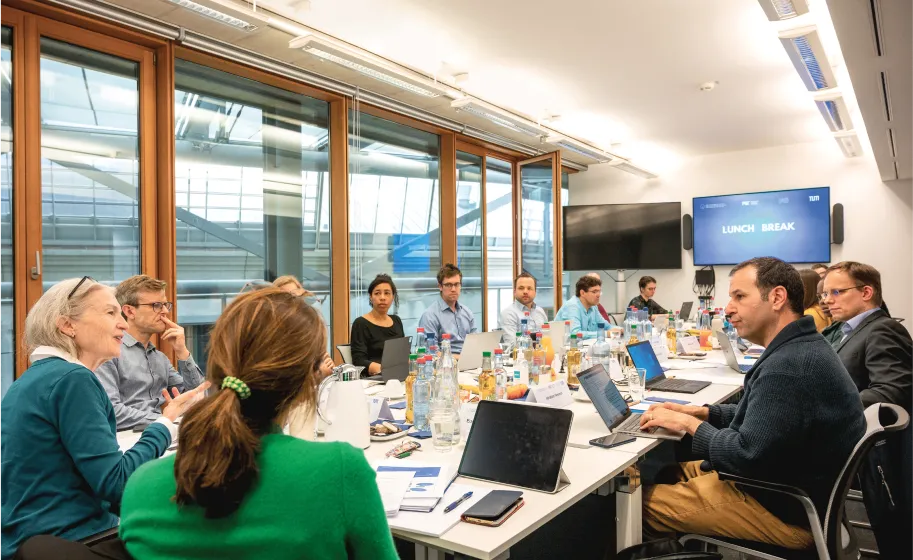Comparative-Historical Perspectives on Platform Capitalism
The projects undertaken during my Fellowship year explored the regulation of new digital platform firms in a broad comparative-historical perspective.

Focus Group: Comparative-Historical Perspectives on Platform Capitalism
Prof. Kathleen Thelen (Massachusetts Institute of Technology), Alumna Hans Fischer Senior Fellow | Patrick Baldes (TUM), Doctoral Candidate | Host: Prof. Eugénia da Conceição-Heldt (TUM)
(Image: Gretchen Ertl)
In a wide range of industries, the advent of the new platform business model poses a host of new regulatory challenges. Among other things, new global giants such as Amazon and Google have put competition and antitrust policy at the top of the public policy agenda. The activities I undertook – both individually and in collaboration with colleagues at TUM – during my research year focused on analyzing these changes in a broad comparative-historical perspective. The results of the projects I undertook over the course of my Fellowship are summarized below.
I completed a book entitled Attention, Shoppers! American Retail Capitalism and the Rise of the Amazon Economy [1]. This book situates the development of retail capitalism in the United States in a comparative-historical perspective. It traces the origins of the Amazon economy to the late 19th century as large-scale retailers capitalized on the uniquely permissive regulatory landscape of the American political economy to outgrow the capacity of the government to regulate them. While their counterparts in Europe faced strong countervailing forces and a far less congenial regulatory landscape, large-scale retailers in the United States enjoyed judicial forbearance and often active government support as they expanded to national scale. Where they encountered resistance, the fragmented regulatory landscape invited venue arbitrage and outright rule-breaking. And as they grew, America’s large discount retailers were able to assemble an ever-growing political support coalition that could be weaponized to head off subsequent regulatory efforts.
I presented this work twice while I was at TUM, once at the Garching campus and once within the Political Science Department at the TUM School of Social Sciences and Technology.
The book is now forthcoming with Princeton University Press.
In addition, I collaborated with TUM postdoctoral researcher Chase Foster on two additional articles.
The first of these, entitled “Brandeis in Brussels? Bureaucratic Discretion, Social Learning, and the Development of Regulated Competition in the European Union,” [2] explores parallels between proposals for a revision in American antitrust advanced by so-called “neo-Brandeisians” and features of the contemporary EU competition regime.
Within the United States, neo-Brandeisian legal scholars have recently revived the ideas of Supreme Court Justice Louis Brandeis, who championed state regulation that preserved market competition and economic liberty in the face of concentrated private power. Yet ultimately and perhaps paradoxically, it has been Europe and not the United States that has proved more hospitable to accommodating key features of the Brandeisian approach. We explain this outcome by tracing the evolution of EU competition law to gain insight into the social learning processes through which such regimes change over time. We argue that the EU’s administrative system, which provides the European Commission with significant bureaucratic discretion, has facilitated processes of ongoing deliberative adjustment to policy and practice, which over time has resulted in a system of ‘regulated competition’ with striking similarities to the Brandeisian vision. The analysis highlights how administrative law institutions condition how regulatory regimes evolve in response to acquired experience and knowledge.
This article has been published in the meantime, appearing online first in December 2023 in Regulation and Governance.
Chase Foster and I also published a short, more policy-oriented blogpost based on this article, and that appeared in the blog Law and Political Economy.
Chase Foster and I are currently working on a second article that we also initiated during my Fellowship year. This article is entitled “Coordination Rights, Competition Law and Varieties of Capitalism,” [3] and it provides a new framework for analyzing changes in competition regimes and their impact on the organization of markets.
Competition law – the rules governing where interfirm coordination is allowed and where competition is required – is a key constitutive institution in capitalist markets. Yet comparativists have spent decades debating the varieties of capitalism framework – which places the issue of coordination at the center of the distinction between coordinated and liberal market economies – while paying virtually no attention to cross-national variation in competition regimes. This article develops an original theoretical framework to conceptualize the relationship between competition law and the organization of capitalism. Building on seminal work on US antitrust law by the legal scholar Sanjukta Paul (2020), we identify the distinct ways in which competition regimes in Europe and the United States have enabled and protected different forms of coordination, with important implications for capitalist market structures. We go beyond the usual binaries – “coordinated” versus “liberal market economy,” “restrictive” versus “permissive” antitrust regimes – to disentangle two dimensions of the law that fundamentally shape patterns of coordination and competition both across regulatory jurisdictions and over time. Applying our framework to analyze the evolution of European and American competition law, we show how a comparative coordination rights framework can be used to conceptualize key institutional changes within contemporary capitalist systems.
This article is currently a “Revise and Resubmit” in Comparative Political Studies.
In addition, my host Eugénia da Conceição-Heldt and I convened a workshop on 19 May 2023, on “Governing the Digital Economy” that we hope will result in a special journal issue. (Fig. 1).
Finally, together with Eugénia da Conceição-Heldt, I co-advised the work of the doctoral candidate Padrick Baldes on the theme “Regulating New Platform Firms,” which will advance our understanding of the regulation of new technologies within the European Union.
[1]
Thelen, K. (forthcoming).
[2]
Foster, C. et al. (2023a).
[3]
Foster, C. et al. (2023b).
Selected publications
- Thelen, K. Attention, Shoppers! American Retail Capitalism and the Origins of the Amazon Economy. Princeton: University Press (forthcoming).
- Foster, C. & Thelen, K. Brandeis in Brussels? Bureaucratic Discretion, Social Learning, and the Development of Regulated Competition in the European Union. Regulation and Governance (2023a). www.doi.org/10.1111/rego.12570
- Foster, C. & Thelen, K. Brandeis in Brussels: What American Reformers Can Learn from the European Union. In blog Law and Political Economy (LPE project) (2023b). Retrieved from www.lpeproject.org/blog/brandeis-in-brussels-american-antitrust-reform-european-union/
